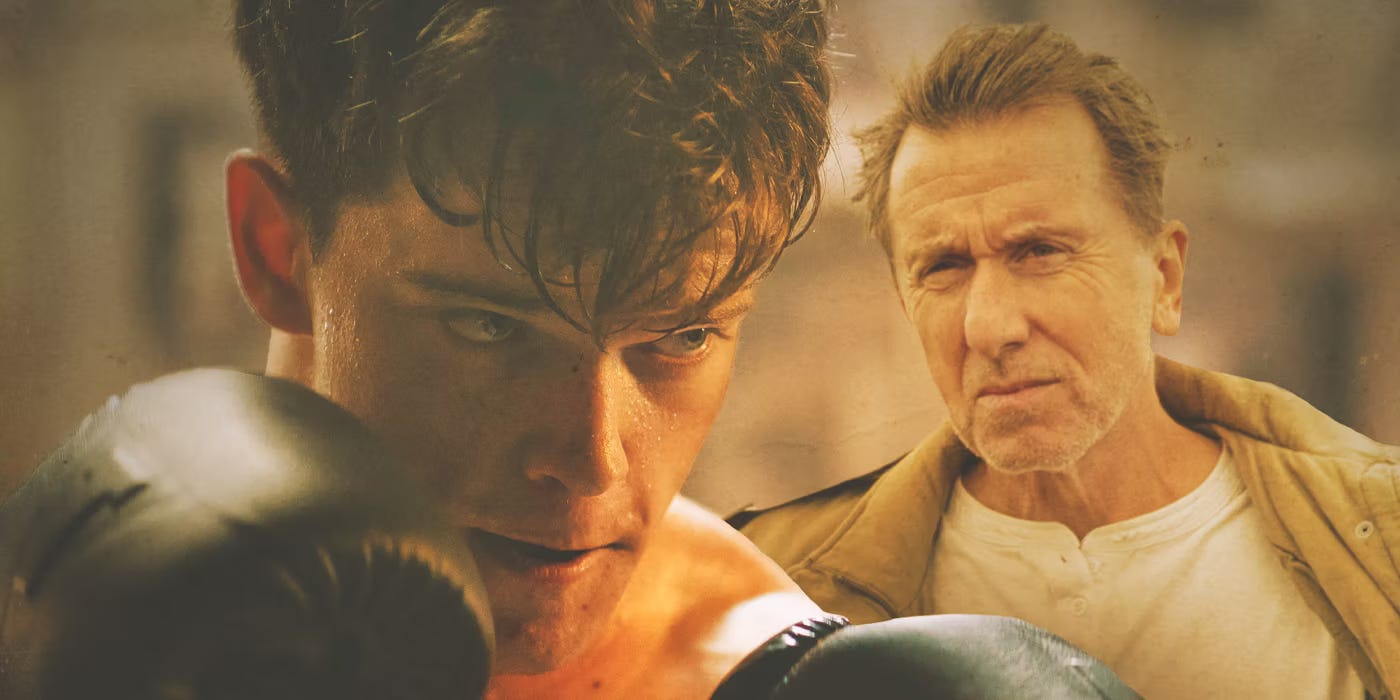Punch
Coming of age/coming out of the closet boxing drama telegraphs a lot of its punches and not all of them land.
Film Yap is a reader-supported publication. To receive new posts and support my work please consider becoming a free or paid subscriber.
Despite being well intentioned “Punch” (available in select theaters and on VOD beginning Friday, March 10) telegraphs a lot of its shots and only some of them land.
Jim Richardson (Jordan Oosterhof) is a promising teenage boxer living in Pirau, New Zealand. He’s training for his first professional fight under the tutelage of his alcoholic father Stan (Tim Roth). Jim’s a golden boy who’s popular with his schoolmates and sparring partners and has a pretty girlfriend named Chelsea (Abigail Laurent). Jim also has a secret – he’s gay.
He begins pining for and hanging out with Whetu (Conan Hayes), a sharp-tongued, out, Maori classmate who Jim’s buddies bully. Whetu has emancipated himself and lives in a beachside shack with his dog Moimoi. Whetu has intentions of moving to Sydney and working as a singer/songwriter, which coincidentally enough corresponds to Jim’s interest in directing music videos.
When Jim and Stan begin butting heads, the younger Richardson links up with rival trainer/promoter Ron Pyott (Wesley Dowdell) – this, despite his father’s warnings against doing so. As it turns out Stan’s message was merited – Ron’s a sadist who’s looking to exploit Jim and knows more about the closeted young man’s sexuality than he initially lets on.
“Punch” is writer/director Welby Ings’ feature debut and it’s obvious this is a personal story for the filmmaker. Ings, a professor of design at Auckland University of Technology, does a lot right in his initial outing. He garners good, moving performances from Oosterhof, Hayes and Roth, though I wish Roth were given more to do and a few other notes to play. New Zealand’s beaches look beautiful through the photography of Matt Henley (“Coming Home in the Dark”). The training montages are appropriately exhilarating as the result of Henley’s cinematography working in conjunction with Paul Maxwell’s editing.
Ings does hit some stumbling blocks along the way however. “Punch” sometimes feels less like a cohesive story and more like a coming of age indie movie checklist. The dialogue is often repetitive. This isn’t hyperbole, but at least one-quarter of the lines uttered are characters telling one another to, “F*ck off.” I’m no homophobe and I’m certainly no prude, but the sequence in which Jim and Whetu consummate their relationship has got to be one of the strangest sex scenes I’ve seen in a hot minute. The actors’ bodies aren’t photographed in the most flattering light … and there’s so much damned sand at play … my crack was cringing. Lastly, there’s a nonsensical bit at the picture’s conclusion in which Jim’s editing a music video featuring footage of Whetu despite the fact that he wasn’t there and if he had been he should’ve intervened on his lover’s behalf as something horrible was about to befall him.
“Punch” isn’t a bad film by any means, but there are stronger contenders in this cinematic ring. If I wanted to watch a recent “gay” movie “Bros” is a much better choice. If I wanted to watch a boxing picture “Creed III” wins by a unanimous decision. This “Punch” was slightly pulled.



